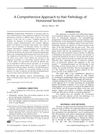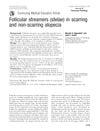Search
for
Sort by
Research
510-540 / 1000+ results
research Topical Minoxidil (3%) in Extensive Alopecia Areata, Including Long-Term Efficacy
3% topical minoxidil effectively treats extensive alopecia areata with few side effects.

research Acne Keloidalis Nuchae: Prevalence, Impact, and Management Challenges
Acne keloidalis nuchae is a tough-to-treat condition that greatly affects quality of life, especially in men of African descent.

research Trichodynia: A Review of the Literature
Trichodynia is a painful scalp condition linked to hair loss and inflammation, often with anxiety, affecting more women and needing better treatment options.

research Erosive Pustular Dermatosis of the Scalp: A Multicenter Study
High-potency steroids or tacrolimus are effective treatments for Erosive Pustular Dermatosis of the Scalp.

research A Comprehensive Approach to Hair Pathology of Horizontal Sections
A new method using visual aids to diagnose hair diseases was effective after brief training.

research Dermatoses in Overweight and Obese Children and Their Relationship With Insulin and Skin Color
Being overweight can cause or worsen skin problems in children, some more common in darker skin, and is often linked to insulin resistance.

research Risk Factors and Prognosis of Folliculitis at Recipient Sites Following Hair Restoration Surgery
Younger people and those with existing acne are more likely to get folliculitis after hair restoration surgery, but it doesn't affect the overall good hair growth result.

research Response to Letter to the Editor on Inflammation in Androgenetic Alopecia
Inflammation and fibrosis are important factors in hair loss, but more research with better control samples is needed.

research Hair Disorders
Different hair disorders have specific treatments and outcomes, with some resolving on their own and others requiring medication or emotional support.

research Modern Artificial Hair Implantation: A Pilot Study of 10 Patients
Artificial hair implantation is generally safe and can restore hair when other treatments fail, but some patients may experience side effects.

research Automatic Artificial Hair Implant: Safety and Efficacy in Androgenetic Alopecia. A Prospective Study with a Highly Biocompatible Fiber
Implant safely and effectively treats hair loss.

research Is Seborrhoeic Dermatitis Associated with Diffuse, Low-Grade Folliculitis and Progressive Cicatricial Alopecia?
Seborrhoeic dermatitis may cause a condition called "seborrhoeic folliculitis," leading to chronic scalp inflammation and scarring hair loss.
research A Randomized, Double-Blind Controlled Clinical Study to Evaluate the Efficacy and Safety of Minoxidil Topical 2% Nanosuspension with Aqueous Base in the Treatment of Androgenetic Alopecia Areata
The 2% minoxidil nanosuspension is as effective as the commercial product but safer and easier to use.

research Cholesterol Homeostasis: Links to Hair Follicle Biology and Hair Disorders
Cholesterol balance is important for hair health, and problems with it can lead to hair loss conditions.

research Novel Therapies for Alopecia Areata: The Era of Rational Drug Development
New targeted therapies for hair loss from alopecia areata show promise, with personalized treatment expected in the future.

research Issue Information - Table of Contents
The journal covered various dermatology topics, including treatments, disease management, and research findings.

research Hair Loss in Children
Most hair loss in children is caused by a few common conditions, and it's important to diagnose these properly and support the child's mental health.

research Non-Neoplastic Disorders of Hair
The document concludes that different types of hair loss have specific treatments, and early diagnosis is crucial for preventing permanent hair loss.

research Follicular Streamers (Stelae) in Scarring and Non-Scarring Alopecia
Hair root sheaths are more common in non-scarring hair loss and help diagnose the type of hair loss.

research Cicatricial Alopecia: Diagnosis and Treatment Overview
Cicatricial alopecia causes permanent hair loss and is treated to relieve symptoms and stop progression.

research Vertical vs. Transverse Sections of Scalp Biopsy Specimens: A Pilot Study on the Comparison of the Diagnostic Value of Two Techniques in Alopecia
Transverse scalp sections are better for diagnosing non-scarring hair loss, while vertical sections are better for a specific scarring hair loss called lichen planopilaris.

research Approach to Hair Loss in Women of Color
Proper education can prevent traction alopecia in women of color.
research Consensus on the Treatment of Alopecia Areata – Brazilian Society of Dermatology
Tailored treatments for alopecia areata are recommended based on severity and patient needs.

research Hair Loss Pattern Due to Chemotherapy-Induced Anagen Effluvium: A Cross-Sectional Observation
Chemotherapy often causes patterned hair loss, with some scalp areas more resistant to hair loss than others.

research Lichen Planopilaris: Mechanisms, Subtypes, and Diagnosis
Lichen planopilaris causes permanent hair loss and scarring due to damage to hair follicles and can be mistaken for other hair loss conditions.

research Follicular Unit Extraction (FUE) Hair Transplant: Curves Ahead
FUE hair transplant is a promising method with benefits like less scarring, but requires a skilled surgeon and can damage hair follicles.

research Assessment of Hair and Scalp Disorders
Hair and scalp disorders significantly affect self-esteem, and using cosmetic products like conditioners and styling aids can improve hair health and appearance.

research Hair Follicles, Their Disorders, and Their Opportunities
Hair follicles offer promising targets for delivering drugs to treat hair and skin conditions.

research Gender Aspects in Skin Diseases
Men are more likely to get infectious skin diseases, while women are more prone to autoimmune and pigment-related skin conditions, influenced by biological and environmental factors.